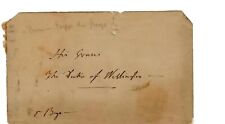

|
Site Categories |

|
Featured Items |

Poodle, Spaghetti Trim, Ucagco


|
RARE "Corsican Politician" Carlo Andrea Pozzo di Borgo Signed Page COA For Sale


When you click on links to various merchants on this site and make a purchase, this can result in this site earning a commission. Affiliate programs and affiliations include, but are not limited to, the eBay Partner Network.

RARE "Corsican Politician" Carlo Andrea Pozzo di Borgo Signed Page COA:
$699.99
Up for sale aRARE! "Corsican Politician" Carlo Andrea Pozzo di Borgo Signed Page.Thisitem is certified authentic by Todd Mueller sales and comes with theirCertificate of Authenticity. ES-392A Count Carlo Andrea Pozzo di Borgo(French:Charles-André Pozzode Borgo,Russian:Карл Осипович Поццоди Борго,KarlOsipovich Pozzo di Borgo; 8 March 1764 – 15 February 1842) was aCorsicanpolitician who became aRussiandiplomat. He was born atAlata, nearAjaccio, of a noble Corsican family, four years before theisland became aFrenchpossession. He was educatedatPisa, and in early life was closely associated withNapoleonandJoseph Bonaparte, the two families at that time being closepolitical allies. Pozzo was one of two delegates sent to the National AssemblyinParisto demand the political incorporation of Corsicainto France, and was subsequently one of the Corsican deputies to theLegislative Assembly, where he sat on the benches of the right until theevents of August 1792.On his safe return to Corsica he was warmly received byPasquale Paoli, but found himself in opposition to theBonaparte brothers who belonged to a different Corsican clan (and one hedetested) who were now veering towards theJacobinparty. Under the new constitution Pozzo waselected procureur-general-syndic, that is, chief of the civil government, whilePaoli commanded the army. Along with Paoli, he refused to obey a summons to thebar of the Convention, and the final breach with the Bonapartes, who activelysupported the revolutionary authorities, dates from this time. Eventually Paoliand Pozzo accepted foreign help, and from 1794 to 1796, during the Britishprotectorate of Corsica, Pozzo was president of the council of state under SirGilbert Eliott. When Napoleon sent troops to occupy the island Pozzo wasexcepted from the generalamnesty, and took refuge inRome,but the French authorities demanded his expulsion, and gave orders for hisarrest in northern Italy. After a short stay in London he accompanied in 1798Sir Gilbert (nowGilbert Eliott, 1st Earl ofMinto) on an embassy toVienna, where he lived for six years and was well received inpolitical circles. His hatred of Napoleon dominated his life, and even as anexile of no official standing he was recognized as a dangerous enemy. In 1804through the influence ofPrince Adam Czartoryskiheentered the Russian diplomatic service, and was employed in 1805 as Russiancommissioner with the Anglo-Neapolitan, and in 1806 with thePrussianarmy. He was entrusted with an important missiontoConstantinoplein1807, but the conclusion of the alliance between TsarAlexander I of RussiaandNapoleon atTilsitin July interrupted his career, necessitating atemporary retirement after the completion of his business with the Porte. Hereturned to Vienna, but on the demand of Napoleon for his extraditionMetternichaskedhim to leave the capital. In London, where he found safety from Napoleon. Herenewed many old ties, and had an affair with the noted society beautyEmily Lamb, CountessCowper, and may have fathered one or more of her children.[1]He remained in England until 1812,when he was recalled by Alexander. He diligently sought to sow dissension inthe Bonaparte household, and in a mission toSwedenhe secured the co-operation of Bernadotte againstNapoleon. On the entry of the allies into Paris he became commissary general tothe provisional government. At theBourbonrestoration General Pozzo di Borgo became Russianambassador at theTuileries, and sought to secure a marriagebetweenCharles Ferdinand, Duke ofBerry, and the Russian grandduchess Anna, Alexander's sister. Pozzoassisted at theCongress of Vienna, andduring theHundred DayshejoinedLouis XVIIIinBelgium, where he was also instructed to discuss the situationwith theDuke ofWellington. He was present atWaterlooand wassingled out byThe Duke ofWellingtonin his post battle dispatch.[2]The Tsar dreamed of allowing anappeal to the people of France on the subject of the government of France inaccordance with his vague liberalizing tendencies, but Pozzo's suggestions inthis direction were met by violent opposition, the Duke refusing to make anyconcessions to what he regarded as rebellion; but in St. Petersburg, on theother hand, his attachment to the Bourbon dynasty was considered excessive. Duringthe early years of his residence in Paris Pozzo laboured tirelessly to lessenthe burdens laid on France by the allies and to shorten the period of foreignoccupation. That his French sympathies were recognized in Paris is shown by thestrange suggestion that he should enter the French ministry with the portfolioof foreign affairs. He consistently supported the moderate party at court, andstood by the ministry of theDuc deRichelieu, thus earning the distrust and dislike of Metternich, whoheld him responsible for the revival of Liberal agitation in France. Hisinfluence at the Tuileries declined with the accession ofCharles X, whosereactionary tendencies had always been distasteful to him; but at therevolution of 1830, when the Tsar Nicholas was reluctant to acknowledgeLouis Philippe, he didgood service in preventing difficulties with Russia. In 1832 he visitedSt Petersburg; the next year he was in London renewing itsrelations with Wellington, and early in 1835 he was suddenly transferred totheLondonembassy in succession toPrince Lieven. Although he did not lose in official standing,Pozzo was aware that this change was due to suspicions long harboured invarious quarters in St Petersburg that his diplomacy was too favourable toFrench interests. He complained that the BritishForeign Secretary,LordPalmerston, treated him with appalling rudeness, once keeping himwaiting for two hours; the fact that he had once been the lover ofLady Cowper,Palmerston's mistress, cannot have made for friendly relations between the twomen.[3]In London his health suffered, andhe retired from the service in 1839 to spend the rest of his days in Paris. Hehad been made a count and peer of France in 1818.

|
|
Related Items:
RARE "Corsican Politician" Carlo Andrea Pozzo di Borgo Signed Page COA $999.99

RARE 1941 Original 8x10 Photo "The Corsican Brothers" Ruth Warrick Akim Tamiroff $4.71

RARE 1979 Corsican Steel Booklet Andrea Ferrara Swords Blades Italych227 $74.99
|
|


|
Shopping Cart  |

|
Recently Viewed |

|
Latest Items |

|
Facebook |
Secure Websites

|








